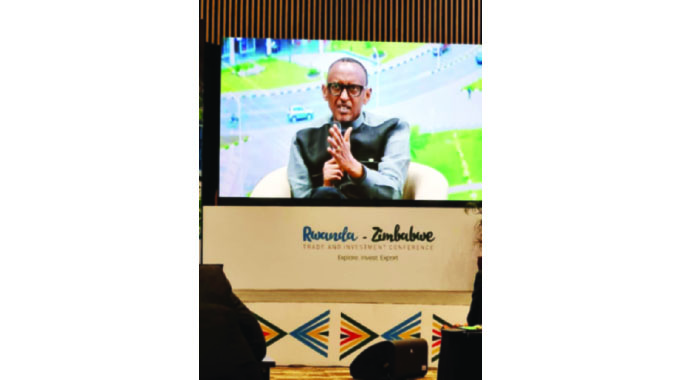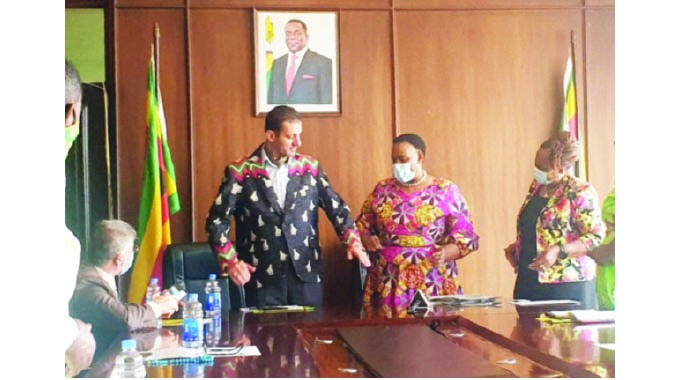Rwanda keen on Zim teachers

From Victoria Ruzvidzo in Kigali, Rwanda
Rwandan President Paul Kagame has said Zimbabwe and his country share a common history that gives impetus to current efforts to develop the two countries and consolidate existing relations.
The ongoing Rwanda and Zimbabwe Trade and Investment Conference marked a major step in cementing the relations and outcomes needed to be implemented with urgency.
Addressing the conference here yesterday, President Kagame said Rwanda was keen on doing business with Zimbabwe. He immediately called on the latter to send teachers here to boost the education sector.
“The history of both countries is marked by moments of adversity and tragedy but also successes. We are part of wider African experiences. But progress does not come easy, it requires hard work and self-reliance but self-reliance does not mean being alone. No one can prosper without cooperation within our region.
“We have to come together, pool our resources and knowledge and reinforce one another. The African Free Trade Area provides us with a framework of aligning our strengths but the business rational for collaboration is that we (Zimbabwe and Rwanda) have a great deal to offer each other, so let’s make the most of it and act on the outcomes of this conference with a sense of urgency,” he said.
On Tuesday Zimbabwe and Rwanda signed five Memoranda of Understanding in the fields of Information and Communication Technology and e-Government, Agriculture and Livestock Development, Tourism, Environment and Climate Change and cooperation in the private sector.
Over the past few days a number of deals have been secured across sectors, some of which will be operationalised from next week.
President Kagame said time was of essence.
“I want to emphasise one thing that the deputy CEO of the Rwanda Development Board mentioned that Zimbabwe can offer equipment but before equipment I want people. Zimbabwe can offer us good teachers.
“Please work on that with a sense of urgency and find whatever number of good qualified teachers we can absorb because we need them, we need them urgently,” he said.
Zimbabwe is renowned for its high literacy levels and the quality of its education that has seen its nationals occupy key positions in many countries in Africa and abroad.
In an ensuing question and answer session with delegates, President Kagame said the continent needed to find solutions to challenges brought about by Covid-19 and tragedies such as the 1994 genocide against the Tutsi which left more than one million people dead.
Full story on www.herald.co.zw
It was critical for countries to look at the root of most problems to come up with lasting solutions. Involving people at all levels would also assist in establishing more sustainable solutions.
He had been asked by AB Communications chief executive Benson Mbewe, who moderated the interactive session, on the tricks leaders could apply in face of adversity.
“There are no tricks, shortcuts or any magic. As human beings we can only do what is humanely possible. Look at challenges we have had before . . . in our country 27 years ago. It’s not a tragedy that just happened. It has a history to it. It built over many years and ended in genocide just like Covid-19 that has affected the whole world.
“If you observe carefully, Covid-19 has also exposed our weaknesses. In Rwanda we did not make sufficient investment in public health then we ask why we did not make the investments before.”
Therefore, it was critical to assess the problem from the beginning to ensure it did not recur. In the case of the genocide, Rwanda had had to assess the political, economic and social context in resolving the issue.
“Already people had cast us as a failed state. They did not give us a chance. They thought there was no tomorrow for Rwanda.”
The country was renowned for discipline, a facet he attributed to involving people in finding solutions and ensuring they realised that the solutions were ultimately meant to benefit them.
He said Rwanda was on a journey in search of prosperity and development, with a desire to achieve high-income status within the next 10 years.
Addressing the meeting at the end of formal proceedings yesterday, Industry and Commerce Minister Dr Sekai Nzenza said under President Mnangagwa’s leadership, Zimbabwe was geared towards economic development. Government had embarked on infrastructure projects such road rehabilitation and construction, and energy to facilitate private sector led growth under the National Development Strategy 1.
The new MOUs would help operationalise the vision.
She stressed that Zimbabwe had huge potential to supply Rwanda with agricultural and horticultural produce and equipment, pharmaceuticals, textiles, construction expertise and education while it would benefit from ICT and light manufacturing products from the latter.
“The private sector must continuously collaborate. Zimbabwe has a lot to learn on ease of doing business,” she said.
In an interview Zimbabwe’s Ambassador to Rwanda Professor Charity Manyeruke welcomed the call for teachers from Zimbabwe by President Kagame saying this would deepen already existing relations.
“People are the greatest assets that we have between our two great nations. The machines, as President Kagame said, will follow the people.
“The President has invited the Government of Zimbabwe to bring teachers because of the excellent relations between two friendly countries,” she said, adding that the two would be sharing best practices such that while Zimbabwe would provide teachers, Rwanda had provided energy experts who were currently working with Zesa back home.










Comments